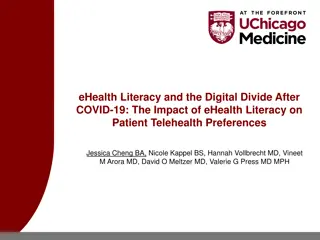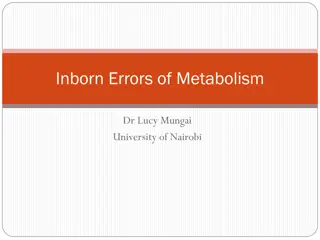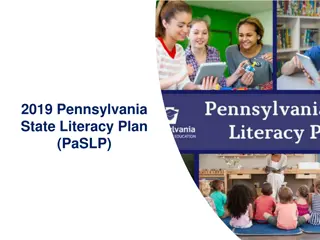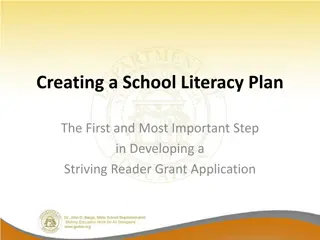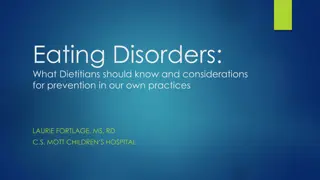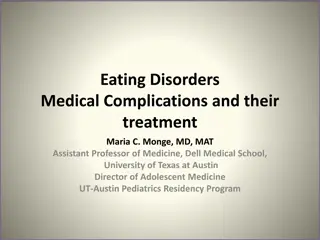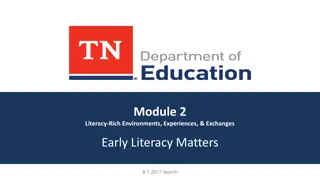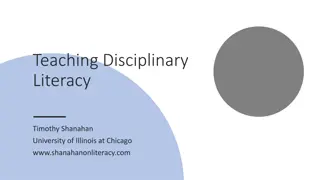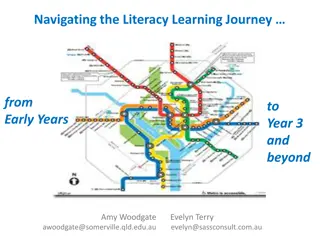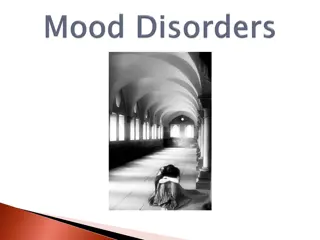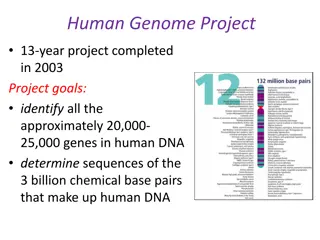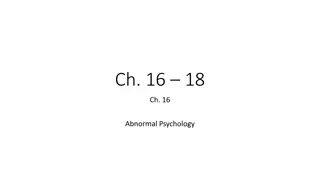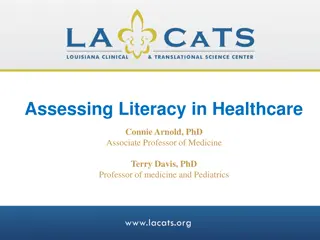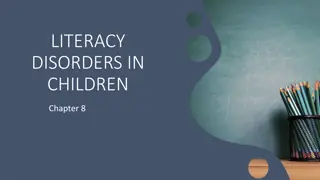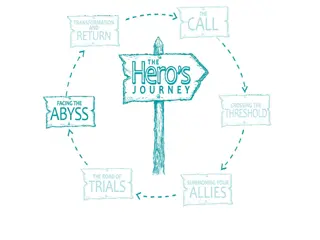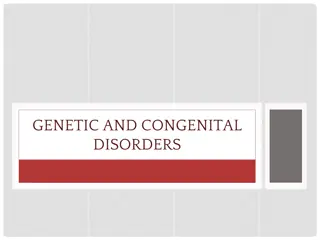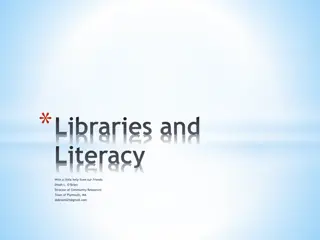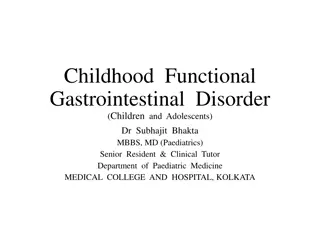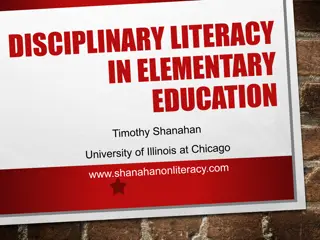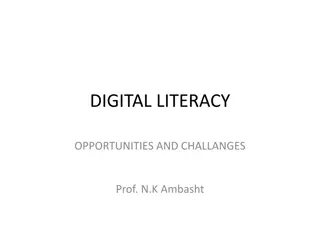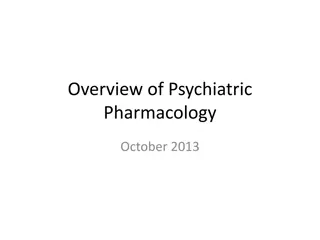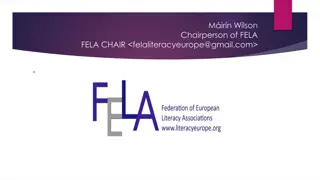Literacy Coaches and Reading Specialists Program Overview
The Literacy Coaches and Reading Specialists Program, led by the California Department of Education, aims to enhance literacy outcomes for students. The program covers key aspects such as allocations, educator training, community building, and funding distribution to local educational agencies. The
2 views • 38 slides
Overview of Human Genetic Disorders
Human genetic disorders encompass a range of conditions, from recessive disorders like cystic fibrosis to dominant disorders such as Huntington's disease. Examples include cystic fibrosis, Huntington's disease, and sickle-cell anemia. Understanding genetic disorders involves research and awareness o
0 views • 10 slides
Overview of Anxiety and Related Disorders
Anxiety disorders, such as PTSD, panic disorders, phobias, agoraphobia, and OCD, are characterized by varying degrees of fear and distress. Anxiety is a normal response to danger, but when it becomes chronic, it can lead to debilitating conditions. PTSD occurs post-trauma, panic disorders involve in
1 views • 42 slides
Health Literacy in Rural Appalachia: Understanding the Impact and Needs
Health literacy is crucial in rural Appalachia where low literacy levels contribute to poor health outcomes. Understanding, supporting, and improving health literacy among the population can lead to better health decisions and reduced disparities in healthcare access and outcomes. This article explo
0 views • 16 slides
Understanding Somatic Symptom Disorders, Conversion Disorders, and Dissociative Disorders
Somatic symptom disorders manifest as physical symptoms without apparent cause, while conversion disorders involve specific physical symptoms incompatible with medical conditions. Illness anxiety disorder involves interpreting normal sensations as disease symptoms. Dissociative disorders lead to a s
1 views • 41 slides
Understanding the Impact of eHealth Literacy on Telehealth Preferences Post-COVID-19
The research explores the relationship between eHealth literacy and patient telehealth preferences after the COVID-19 pandemic. It highlights disparities in telehealth use among different demographics, emphasizing the importance of digital literacy for accessing healthcare services. The study aims t
0 views • 19 slides
Understanding Inborn Errors of Metabolism and Metabolic Disorders
Inborn Errors of Metabolism (IEM) are genetic disorders that disrupt metabolic pathways, leading to substrate accumulation or product deficiency. These disorders can be classified based on toxic accumulation, protein metabolism, carbohydrate intolerance, lysosomal storage issues, energy production d
0 views • 29 slides
Understanding Co-occurring Mental and Physical Health Conditions
Co-occurring mental and physical health disorders are prevalent and require an integrative multidisciplinary approach for effective assessment and treatment. This holistic approach helps address the complexity of managing multiple disorders in an integrated healthcare setting. Through a multi-direct
1 views • 37 slides
Pennsylvania State Literacy Plan (PaSLP) Overview
Pennsylvania State Literacy Plan (PaSLP) aims to improve literacy learning outcomes by providing districts and charter schools with guidance and tools to develop local literacy plans, facilitate data-driven decision-making, and create 21st-century classrooms. The plan underscores key guiding princip
2 views • 26 slides
Literacy Coaches and Reading Specialists Program Overview
State Superintendent of Public Instruction Tony Thurmond provided opening remarks at the December 5, 2022 webinar on the Literacy Coaches and Reading Specialists Program. The session covered program details, allocations, allowed expenditures, and additional supports. Participants engaged in a poll o
0 views • 44 slides
Understanding Functional GI Disorders: A Comprehensive Overview
Functional GI disorders encompass a range of conditions affecting the gastrointestinal system, such as irritable bowel syndrome and disorders of the gut-brain interaction. These disorders are characterized by no structural abnormalities but are influenced by factors like motility disturbance, viscer
0 views • 42 slides
Developing a Comprehensive School Literacy Plan
Creating a school literacy plan is crucial for student success. Each school should have its unique plan, while districts can also develop one to support their schools effectively. The goal is to provide gold-standard literacy instruction, preparing students for college and career readiness. A synthe
2 views • 21 slides
Understanding Genetic Disorders and Their Impact on Health
Genetic disorders are caused by abnormalities in genes or chromosomes, leading to various health conditions. Inherited disorders can be passed down from parents to children, affecting physical makeup and processes in the body. In India, there is a high prevalence of genetic disorders, particularly i
1 views • 12 slides
Understanding Eating Disorders: Types, Signs, Effects, and Recovery
Eating disorders are mental disorders characterized by unhealthy eating habits and can have severe physical and psychological consequences. This article explores the definition of eating disorders, signs to look out for, different types such as Anorexia Nervosa, Bulimia Nervosa, Pica, and Purging Di
0 views • 10 slides
Understanding Eating Disorders: Insights for Dietitians
Eating disorders are complex neurobiological conditions that are not merely about control or weight management. These disorders can affect individuals of all genders, body sizes, and socioeconomic backgrounds. Dietitians play a crucial role in identifying, assessing, and treating eating disorders, a
0 views • 41 slides
Understanding Eating Disorders: Medical Complications and Treatment
This presentation by Dr. Maria C. Monge covers the common eating disorders in teenage patients, potential medical complications, and the role of the medical team in treatment. It includes definitions of disorders like Anorexia Nervosa, Bulimia Nervosa, and Binge Eating Disorder according to DSM-5 cr
0 views • 60 slides
Module 2: Literacy-Rich Environments and Experiences for Early Literacy Development
In Module 2, you will explore the importance of creating literacy-rich environments for young children to enhance language development. Reflect on positive interactions, intentional planning, and ways to engage children in meaningful literacy activities. Discover how classroom arrangements and mater
0 views • 14 slides
Master's in Language & Literacy: Trademark Outcome and Alignment with ILA Standards
The Language & Literacy Master's specialization aims to equip students with essential skills to become literacy leaders through in-depth knowledge and practical application of literacy methods. The program emphasizes the importance of sustaining professional collaboration and improving diverse learn
0 views • 17 slides
Understanding Neurodevelopmental Disorders in Childhood and Adolescence
Neurodevelopmental disorders in childhood and adolescence encompass a range of conditions including intellectual disabilities, communication disorders, autism spectrum disorder, and attention deficit/hyperactivity disorder. These disorders impact cognitive development, adaptive functioning, and comm
0 views • 30 slides
The Significance of Visual Literacy in Today's World
Visual literacy is increasingly crucial in our modern society, with children learning and communicating through images. Understanding the hidden messages in visual content is vital for effective communication and learning. As technology evolves, the connection between visuals and knowledge becomes m
0 views • 21 slides
Understanding Content Area Literacy vs. Disciplinary Literacy
Content area literacy focuses on improving reading comprehension and study skills across disciplines, while disciplinary literacy delves into discipline-specific ways of using text to create and evaluate knowledge. Expert reader studies and the specialization of literacy further highlight the nuance
0 views • 56 slides
Understanding Sleep Disorders: Classification and Diagnosis
Sleep disorders encompass various conditions affecting sleep patterns and quality. They are classified into categories such as insomnia, sleep-related breathing disorders, central disorders of hypersomnolence, circadian rhythm sleep-wake disorders, parasomnias, and sleep-related movement disorders.
0 views • 32 slides
Navigating Literacy Learning Journey: Early Years to Year 3 & Beyond
Explore the essential skills required for literacy development from early years to year 3 and beyond, focusing on print-based and language-based core literacy skills, functional literacy conventions of writing, and the oral and written language scales. Address challenges in consolidating spelling an
0 views • 13 slides
Understanding Grief and Depressive Disorders: A Comparative Analysis
Grief and depressive disorders share similarities but also have distinct differences. Grief is a universal emotional state following loss, while depressive disorders involve prolonged mood disturbances. The stages of grief include denial, anger, bargaining, depression, and acceptance, with intervent
0 views • 79 slides
Understanding Genetic Disorders and the Human Genome Project
The Human Genome Project, completed in 2003, aimed to identify all human genes and DNA sequences. Genetic disorders, like autosomal disorders and Huntington's disease, can result from mutations at different levels, affecting single genes, chromosomes, or multiple genes. Albinism and cystic fibrosis
0 views • 37 slides
Understanding Abnormal Psychology: Disorders, Symptoms, and Treatments
Explore the world of abnormal psychology through the lens of different disorders like depression, anxiety, and phobias. Learn about the definitions of abnormal behavior, DSM-V classifications, and various types of psychological disorders. Delve into the complexities of mental health conditions such
0 views • 39 slides
Understanding Patient Literacy in Healthcare
Assessing literacy in healthcare is crucial as it can be a barrier for patients in understanding medical instructions and information. Patient literacy is not always apparent, and formal assessments are needed to measure health literacy accurately. Using tests like REALM, TOFHLA, and NVS can help he
0 views • 39 slides
Understanding Literacy Disorders in Children
Introduction to literacy disorders in children, covering the emergent literacy period, assessment, intervention strategies, and parental involvement. Discusses the roles of speech-language pathologists (SLPs) and resource specialists in addressing reading and writing challenges in educational settin
0 views • 35 slides
Developing Literacy Skills for Leadership Excellence
Enhance your speaking, reading, and writing abilities through a comprehensive program designed to transform your literacy skills. Join Teaching Leaders Residential in August 2015 led by Geoff Barton to uncover the secrets of literacy and improve your communication techniques. Explore essential topic
0 views • 89 slides
Financial Literacy and Education Commission: Coordinating Federal Efforts
Financial capability empowers individuals to manage financial resources effectively, make informed choices, avoid pitfalls, and improve their financial well-being. The Financial Literacy and Education Commission (FLEC) works to improve the financial literacy of individuals in the United States throu
0 views • 16 slides
Overview of Classification of Psychiatric Disorders
Psychiatric disorders are illnesses with various manifestations that impact functioning due to disturbances in biological, social, genetic, and other factors. Two key classification systems, ICD-10 and DSM-5, categorize over 200 types of psychiatric illnesses. The ICD-10 includes categories like org
0 views • 18 slides
Overview of Genetic and Congenital Disorders and Their Causes
Explore the terminology, causes, characteristics, and results of genetic and congenital disorders, as well as the disorders of single-gene inheritance. Learn about autosomal dominant disorders like Marfan Syndrome and Neurofibromatosis. Discover how single-gene disorders are inherited and their impa
0 views • 24 slides
Empowering Communities Through Libraries and Literacy Advocacy
Education is fundamental for societal progress, and libraries play a crucial role in promoting literacy and knowledge dissemination. They serve as historical archives, educational hubs, and inclusive spaces for adult learners. The integration of literacy into library services enhances community outr
0 views • 6 slides
Understanding Childhood Functional Gastrointestinal Disorders
Functional Gastrointestinal Disorders (FGIDs) in children and adolescents are characterized by chronic or recurring symptoms that cannot be fully explained by current structural or biochemical tests. These disorders emphasize the role of normal development in symptom presentation and the lack of evi
0 views • 46 slides
Exploring Disciplinary Literacy in Education
Educators have long emphasized the importance of content area reading to improve students' comprehension and study skills across various subjects. However, disciplinary literacy goes beyond basic reading skills, focusing on how different disciplines create, communicate, and evaluate knowledge throug
0 views • 42 slides
Exploring Digital Literacy: Opportunities and Challenges in Education
Explore the realm of digital literacy with a focus on adult education, functionality in changing times, and the impact on citizenship and economic development. Discover the intrinsic connection between literacy, language, and script, and how digital platforms are expanding knowledge sources. Delve i
0 views • 9 slides
Understanding Financial Literacy and Its Importance
Financial literacy is crucial in today's society as it involves knowledge of financial concepts, skills to make effective decisions, and confidence in financial matters. This module explores the definition of financial literacy, its importance for young people, and the impact of financial literacy a
0 views • 20 slides
Understanding Literacy Beyond Traditional Approaches
Explore the expanded concept of literacy beyond traditional school methods like reading and writing, delving into emotional, social, and physical aspects. Discover how everyday experiences contribute to literacy development and its connection to language, culture, and background. Follow the story of
0 views • 21 slides
Overview of Psychiatric Pharmacology: A Comprehensive Guide from 2013
This presentation delves into the nuances of psychiatric pharmacology, exploring common psychiatric conditions, historical perspectives on medical treatments, categories of psychiatric medications, and principles of treatment. It also touches on mental illness definitions from DSM-IV-TR and DSM-V, a
0 views • 27 slides
Promoting Literacy Excellence in Europe: FELA's Commitment and Initiatives
FELA, chaired by Mirn Wilson, brings together 30 literacy organizations across Europe to enhance professional skills, share best practices, and improve literacy at all levels. Through diverse experiences and collaborations, FELA members are dedicated to promoting literacy through research, policy de
0 views • 8 slides





